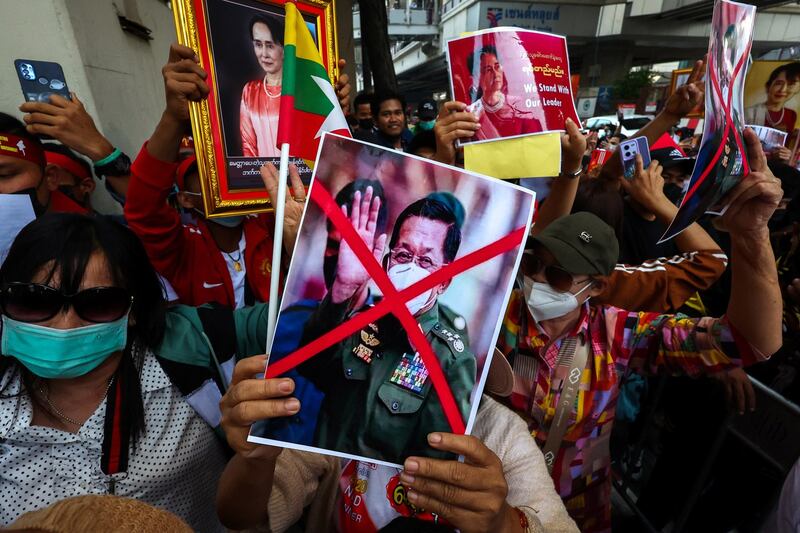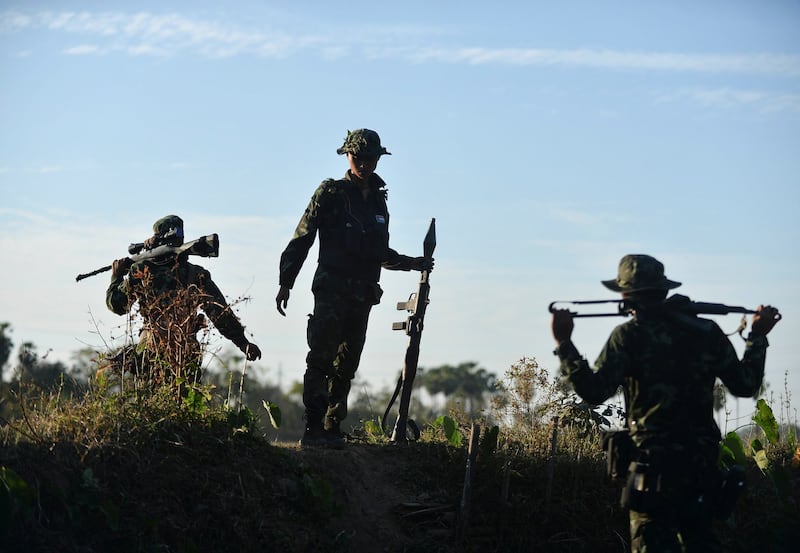UPDATED at 4:00 p.m. EST on 2/1/2023
Junta leaders placed Myanmar under six more months of emergency rule on Wednesday, the second anniversary of their ouster of the civilian government in a coup, citing ongoing resistance to army rule, junta-controlled media reported.
The announcement of the National Defense and Security Council decision to grant junta leader Min Aung Hlaing's request to extend emergency rule for a fifth six-month term came as scores of cities in the country of 54 million people -- Yangon, Mandalay, Naypyidaw, Monywa and others -- stayed empty as residents stayed indoors for a five-hour "silent strike" to protest the unpopular coup. A similar protest was held on the first anniversary of the putsch and other occasions.
The shutdown of traffic and business came despite a junta warning that participants and instigators would be arrested and prosecuted and their homes and properties would seized. Arrests by the military have often meant torture and murder of the activists.
“Today’s silent strike has clearly proved that the people haven’t lost their heart, nor will they let a bunch of these thugs rule the country,” said Nan Lin of the Yangon Strike Force.
“The people already know and are not persuaded by their moves and their political stunts and the people will never comply with their rules,” he told Radio Free Asia.
Junta leaders cited the "extraordinary situation" created by resistance against the military regime for stymieing efforts to hold a general election this year, the report said. Junta chief Senior Gen. Min Aung Hlaing pledged to hold multi-party elections, but opponents have dismissed the election as a sham because it appears rigged to exclude parties ousted by the Feb. 1, 2021 coup and keep junta officials in power.

Min Aung Hlaing, the leader of the coup that ousted and jailed leader Aung San Suu Kyi and her National League for Democracy government about two months after their landslide election victory, faulted "terrorist groups” formed by deposed lawmakers and officials–the Committee Representing Pyidaungsu Hluttaw and the National Unity Government–as well as the numerous local militias known as People’s Defense Forces that have fought the junta across Myanmar since 2021.
“The silent strikes demonstrated the entire people’s opposition to everything that the military is doing and their illegitimate election that they hoped would give them a better standing,” Maung Sa, a young resident of Yangon, told RFA Burmese.
The proposed election has been rejected by civilian parties because of onerous registration and finance regulations unveiled recently that tilt the playing field in favor of the military-backed Union Solidarity Development Party.
In the two previous parliamentary polls, the military proxy party lost badly to Suu Kyi’s National league for Democracy, and its unproven claim of voter fraud in the 2020 election was what prompted the coup. Min Aung Hlaing repeated the voter fraud claim on Wednesday.
"Myanmar’s junta is trying to establish a veneer of credibility by going through the motions of holding ‘elections,’ but the international community shouldn’t be fooled or browbeaten into recognizing this sham,” said Elaine Pearson, Asia director at Human Rights Watch.
'He wants to be president’
Myanmar political analyst Than Soe Naing told RFA that junta chief Min Aung Hlaing would do whatever it takes to stay in power.
“His promise to return to the path of democracy in Myanmar is just a cover story. He wants to be the president,’ he said.
“He wants to gain the presidency himself. But the election will not be accepted by the world, except for Russia and China, of course,” added Than Soe Naing, referring to continued support for the junta from Beijing and Moscow.
“Giving Min Aung Hlaing another six months of power for an emergency situation indicates that they did not succeed in the coup and that they have no control over the country,” said Kyaw Zaw, a spokesman for the National Unity Government.
![Mandalay region NLD office [left] after a bomb blast on Oct. 27, 2021 and the Myeik township and district offices after a bomb blast on Oct. 20, 2021. Credit: RFA](https://www.rfa.org/resizer/v2/FK2L5Y5KDQVCUWTRSHH4F2DOBQ.jpg?auth=2b138cfba469e58ef7e8b26946992875fb9396b554cf2a8bf76b7ada126f7656&width=800&height=449)
In a sign of growing foreign opprobrium toward the junta on the two-year anniversary, the U.S. and its allies on Tuesday announced fresh sanctions on the military regime.
The U.S. imposed sanctions on the Union Election Commission, mining firms and energy officials, and other regime-linked entities, the Treasury Department said. Similar measures were unveiled by Canada, Australia, Britain and Canada.
Washington’s goal is to “foster conditions that end the current crisis, but more importantly, return Burma to the path of inclusive, representative multiparty democracy,” said Derek Chollet, counselor to the U.S. State Department.
“Any election that the regime might have … will have no chance of being free or fair, given that the regime has imprisoned or intimidated nearly all critical potential contenders, and indeed does not control nearly 50% of Burma's territory,” he told reporters.
"We have seen...that sanctions have had some effect on the junta," Chollet said.
"The economy last year in Myanmar contracted by nearly 20 percent. We see investors fleeing, we see foreign currency revert reserves dwindling, and we see it becoming harder for the regime to acquire arms, even though, unfortunately, there continues to be a steady pipeline of arms coming in," he added.
Falling currency, worsening corruption
In a sign of falling confidence in the junta, the value of the country's currency, the kyat, has dropped by 50 percent in the two years to December 2022, according to a report released by the World Bank on Monday.
“The people’s livelihood is becoming more and more difficult. If it goes on like this, it will continue to decline further and the situation of the country will get worse,” said an economist in Myanmar, who requested anonymity for personal safety.
Further fallout from the coup was traced by a leading corruption watchdog.
Myanmar has fallen 17 places in Transparency International's latest Corruption Perceptions Index , supplanting Cambodia as Southeast Asia's worst country for graft for the first time in a decade and ahead of only North Korea in Asia for clean government.
Despite all the adverse developments, the head of a pro-military think tank told RFA things were looking up.
“In summary, we are leading to a more stable situation and it's almost certain that the election is happening,” said Thein Tun Oo, the executive director of Thayninga Institute for Strategic Studies, which is made up of former military officers.
Opponents of the junta, the latest iteration of military governments that have ruled Myanmar for more that 50 of its 75 years since it gained independence from British colonial rule, said the coup had destroyed the country’s fledgling democracy, rule of law and freedom of speech.
“As political parties, we can't go into the public and organize and spread political awareness among the people,” said Tun Aung Kyaw, a senior official of the Arakan National Party, which represents the interests of the Rakhine ethnic minority in western Myanmar.
“There is a very vast difference between the situation now and that of the previous government,” he told RFA.
“We established political parties in order to create a political environment for the people to develop our democracy, but these parties themselves are struggling,” said Sai Laik, the general secretary of Shan National League for Democracy in northern Myanmar.
“When the military operations have replaced the politics of the parties like now, you can say that their role and political activities have become almost non-existent.” he told RFA.
Targeting the opposition
But it is the party of jailed Nobel laureate Suu Kyi, the National League for Democracy, that bore the brunt of junta atrocities.
“The main reason for the military coup is the military dictator’s power-madness and greed to control all sectors of the country forever, regardless of the people’s needs and interests," said Kyaw Htwe, an executive of the National League for Democracy.
According to the National League for Democracy’s human rights research department, junta troops have killed at least 84 party members and officials and arrested at least 1,232 others since the February 2021 coup. Of those killed, 16 died in interrogation, eight in prison, one by execution, and 59 others “for no reason.”
Democracy icon Suu Kyi, 77, was sentenced to another seven years in prison at the end of 2022 on five counts of alleged corruption, bringing the total number of years she must serve in detention to 33 on 24 counts, prison sources said.
Human rights groups estimate 2,900 people have been killed and more than 17,500 have been arrested.
A tally by RFA tracked at least 67 massacres--slayings of four or more people--committed by the military junta in 2022 that claimed 646 lives, including women, children and the elderly.
The civilian deaths were caused by air strikes, summary executions after arrests, live burnings of victims and throat-slitting by soldiers. Many massacres of civilians were acts of revenge by government soldiers or proxy armies following fighting between junta forces and local militias. Marauding junta troops have torched scores of villages, turned helicopter or fighter jet guns on schools and rounded up villagers and killed them.

'Only losers cry'
Residents of Tambaya township in the Sagaing region remained defiant even after junta forces torched 5,000 homes recently. Sagaing, in northwestern Myanmar, has been the epicenter of fighting against military rule and suffered massacres and mass arson for their resistance.
“You can tell them that we are proud to be accused of being with the rebels because they are fighting against injustice,” said a female villager “They can burn our houses, but they can’t burn our will. Only losers cry, not me. I won’t let them win,” she told RFA.
Residents of the France-sized country are struggling with surging commodity prices, power outages, transportation difficulties, crime and lawlessness.
“The junta’s crimes of knowingly killing and brutally torturing innocent civilians, and burning down their villages, cannot be considered mere human rights violations,” said Aung Myo Min, human rights minister of the shadow National Unity Government.
“This is an international level of crime that should be prevented and punished by all countries of the world.”
Reported by RFA Burmese and by Alex Willemyns. Translated by Myo Min Aung. Edited by Paul Eckert and Malcolm Foster.
UPDATED with comments from opponents of the junta and an arson victim.
